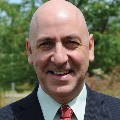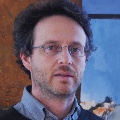Charles Sturt University
Tim Wess
The new executive dean of the faculty of science at Charles Sturt University in Australia, Tim Wess, said that in addition to the excitement and delight of a new job, he was looking forward to having a “house with a pool” and the ability to “explore that side of the world”. He added: “Wagga Wagga is exactly halfway between Melbourne and Sydney with Canberra being a little closer; so plenty to explore.” Professor Wess joins from Cardiff University, where he was head of the School of Optometry and Vision Sciences and pro vice-chancellor of estates, and said he hoped to continue Charles Sturt’s work in developing distance learning. “It is arguably the leading university in distance education in Australia. I believe the quality and innovation it provides will form an increasing part of education delivery worldwide and I want to be fully immersed in this. I can’t think of a better platform to develop this from than at CSU,” he said. His aims also include developing research and education agendas to provide the best environment for both areas, and widening access. Professor Wess, who holds a BSc in biochemistry from Newcastle University and a PhD in biophysics from the University of Edinburgh, held positions at the universities of Edinburgh and Stirling before moving to Cardiff.

University of Huddersfield
Craig Mahoney
The chief executive of the Higher Education Academy said he is looking forward to being “back at the chalkface again” after being named professor of higher education strategy at the University of Huddersfield. Craig Mahoney, who will remain in his HEA post, said that “as it’s not linked to a university, I have felt a bit bereft at not having an academic home…That’s important because in moving out of a university, you quickly lose sight of some of the pressures and opportunities that arise when working with staff and students.” He said he wanted to develop strategy and research at Huddersfield and observed that the jury was still out on one of the biggest recent developments in higher education, massive open online courses. “At the moment [Moocs] have not proven themselves as a viable way of proceeding in the future because [among other things] there are large dropout rates from them,” he said. Professor Mahoney studied chemistry and mathematics at the Tasmanian College of Advanced Education (now the University of Tasmania) and holds a master’s degree and doctorate from the University of Birmingham and Queen’s University Belfast, respectively.

King’s College London
Karen O’Brien
King’s College London’s new vice-principal for education and professor of English literature, whose research interests lie in the Age of Enlightenment, believes that in some ways the higher education sector is due its own equivalent. “I’m currently working on a book on global centres of enlightenment,” said Karen O’Brien, who joins King’s from the University of Birmingham, “[considering] the different ways in which aspirations for fairness, modernisation, freedom and interdisciplinary intellectual enquiry can manifest themselves at these centres; yet they still have a common thread in their development. I see a parallel between research interest in global centres of enlightenment and my own interest in global universities and how they try to raise intellectual aspirations of their students.” In near-identical positions at Birmingham, Professor O’Brien led an ambitious agenda for educational change and curriculum review and was involved in a number of national initiatives, including the shift by some universities from traditional degree classifications to grade point averages, something she still feels passionate about. “It’s very much Birmingham’s intention to migrate old-style degree classifications, which we don’t think adequately capture student achievement in a fair, nuanced way. I’m personally very committed to this and have already indicated that I want to at least open that conversation at King’s.” Educated at the University of Oxford, Professor O’Brien has held academic posts at institutions including the universities of Cambridge, Southampton, Cardiff, Pennsylvania, Edinburgh and Warwick.

Courtauld Institute of Art
Guido Rebecchini
The Courtauld Institute of Art’s new lecturer in 16th-century southern European art said that being offered the position was one of the “moments of your life”. “I had been in doubt and was anxious to know the result,” Guido Rebecchini said. “I told my family that it was beyond my wildest dreams.” His fondness for teaching was also a motivation in taking the role. “I think it’s an important part of my intellectual life,” he said. “In the past 20 years, although I have been teaching, I have been mainly concentrating on research and now I want to make teaching a main part of my work. Not all professors think this way!” Dr Rebecchini studied at the Sapienza University of Rome for his undergraduate degree and the University of Siena and the Warburg Institute, University of London for his master’s and PhD, respectively. He has worked at Syracuse University in Florence, New York University in Florence and the University of Siena.
Other changes
The University of Oxford has made four appointments across the social, life and physical sciences. Danny Dorling, professor of human geography at the University of Sheffield, will take up the Halford Mackinder professorship of geography in September. Martin Seeleib-Kaiser, head of the department of social policy and intervention at Oxford, has been awarded the Barnett professorship of social policy. Peter Rothwell, professor of clinical neurology in the Nuffield department of clinical neurosciences, John Radcliffe Hospital and director of the stroke prevention research unit at Oxford, has been appointed to the Action Research professorship of clinical neurology. In August, Ben Green, Herchel Smith professor of pure mathematics at the University of Cambridge, will take up the Waynflete professorship of pure mathematics.
Rebecca Chandler-Wilde has been named dean of enterprise and business management in the Faculty of Society and Health at Bucks New University. Dr Chandler-Wilde’s new role will focus on providing strategic leadership of the faculty’s enterprise, international and business management portfolio of activities.
The University of Hertfordshire has appointed Sue Grant secretary and registrar. Ms Grant, who joined Hertfordshire in 1983 and is presently the university’s academic registrar, will take up the new post in September upon the retirement of Philip Waters. She is chair of the Academic Registrars Council, and sits on University College London’s Research Appeals Panel.
Sir Peter Gregson, president and vice-chancellor of Queen’s University Belfast, has been appointed chief executive and vice-chancellor of Cranfield University, the UK’s only all-graduate university. Professor Gregson led Queen’s as it gained entry into the Russell Group of research- intensive universities.
To send submissions - with pictures - to the People section email: people@tsleducation.com
Register to continue
Why register?
- Registration is free and only takes a moment
- Once registered, you can read 3 articles a month
- Sign up for our newsletter
Subscribe
Or subscribe for unlimited access to:
- Unlimited access to news, views, insights & reviews
- Digital editions
- Digital access to THE’s university and college rankings analysis
Already registered or a current subscriber?
